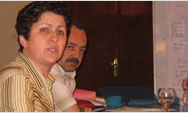 |
|
 |
 |
| |
 |
| |
 |
 |

|
- USAID-State
Strategic Plan 2007-2012
- National
Security Strategy of the United States, March 2006
- Policy
Framework for Bilateral Foreign Aid, January 2006 [PDF,
440 KB]
- White Paper:
US Foreign Aid: Meeting the Challenges of the Twenty-first Century,
January 2004 [PDF, 353 KB]
- Fragile
States Strategy, January 2005 [PDF, 305 KB]
- Democracy
and Governance Strategic Framework [PDF, 343 KB]
- Mitigating
the Development Impacts of HIV/AIDS [PDF, 406 KB]
- Foreign Aid in the National
Interest [PDF, 353 KB]
- Nine Principles,
February 2005
- Business
Transformation
|
|
 |
 |
|
What They Are Saying: William Easterly
Participation of the poor in mainstreaming gender
empowerment for civil society stakeholders to promote
country ownership of good governance for community-driven sustainable development
A column devoted to what our partners and others in the field of foreign assistance are saying about development.
I have just stumbled across a great series of articles on buzzwords in development. Some aid workers and development
scholars are so jaded by these vague but ubiquitous buzzwords that they play “Development Bingo.” Whenever a development pro is giving a lecture, they hold Bingo cards marked with all the buzzwords and check them off whenever the lecturer
mentions them in the talk. When they have got
a full set of buzzwords,
they stand up and shout “Development!” (No doubt leaving more than a few
lecturers baffled.) Some cite good
news on aid
(also from William Easterly’s blog, posted Feb. 19)
A paper forthcoming in the Journal of Economic Literature states:
“There are well known and striking donor success stories, like the elimination of smallpox, the near-eradication of river blindness and Guinea worm, the spread of oral rehydration therapy for treating infant diarrheal diseases, DDT campaigns against malarial mosquitoes (although later halted for environmental reasons),
and the success of WHO vaccination programs
against measles and other childhood diseases. The aid campaign against diseases in Africa … is likely the single biggest success story in the history of aid to Africa...”
“well-known Kremer and Miguel paper showed a strong effect of deworming on worm infection rates in a district in Kenya, which reflected not only direct effects on children receiving the drugs but also surprisingly strong externalities to others in the same school or nearby schools.”
“Breastfeeding, immunization against diarrheal diseases, micronutrient supplementation and oral rehydration therapy (ORT) have all been found to work in randomized trails in the fight against diarrhea....Case studies suggest ORT is another health aid success story, accounting for a substantial
drop in diarrheal mortality since 1980.”
Who is this wild-eyed aid optimist? Oops, it’s me.
The point is that even those of us labeled as “aid critics” do not believe aid has been a universal
failure. If we give you aid agencies grief on failures,
it is because we have seen some successes, and we would like to see more! ★
|
My favorite article discovery
is Andrea Cornwall, “Historical Perspectives on Participation in Development, Commonwealth and Comparative Politics,” Vol. 44, No. 1, 49-65, March 2006. Professor Cornwall is a brilliant anthropologist at the Institute of Development Studies at the University of Sussex. She also guest-edited a fascinating special issue of the journal “Development in Practice” (2007, Volume 17, Issue 4) devoted to “buzzwords
and fuzzwords.”
In my favorite article, Professor Cornwall gives a history of how the aid powers that be have resorted to the buzzword of “participation” to convey good intentions to give the “power to the poor” over aid affairs, while never in fact ceding any such powers.
What is most scary is that “participation” as a buzzword goes all the way back into colonial times. In 1929, a British MP told the Parliament that they had a “moral responsibility”
to give colonial subjects “some participation in the shaping
of their own destinies.” Right after World War II, the Labour government would “inspire these {colonial subject} men with the hope that, as never before …. London could assist them in their work of extending popular participation in public affairs.” The irony that these promises were made by an authoritarian empire run from London apparently escaped notice. The U.S. Foreign Assistance Act of 1966 similarly promised to emphasize “maximum
participation…on the part of the people of the developing countries”—all while the U.S. was propping up dictatorial Cold War allies who were not too interested in giving power to anyone besides themselves.
Today of course, “participation”
(and synonyms like “community-
driven,” “empowering stakeholders,” “local ownership,”
etc., etc.) is everywhere in aid documents. Yet the aid powers giving away their power is not exactly going to happen anytime soon. Cornwall cites the 1998 World Bank “Participation” manual, which lists “the poor and disadvantaged”
as only one of many stakeholder groups (another is “World Bank management, staff, and shareholders.”) I wonder
which stakeholder is going to win the next battle.
The main function of buzzwords
such as “participation” and “empowerment” is to paper over the ugly reality that there will be some battles of conflicting
interests between “the poor and disadvantaged” and other more powerful groups like the World Bank and rulers of poor countries—and that the poor will almost always lose such battles.
Using clear language instead of buzzwords would at least force us to confront the reality of the battle for real democratic rights. We should use words that have historically been associated with popular movements actually
seeking power to the people (even if those are also misused and have conflicting meanings, at least they meant something historically).
One word that is extremely unpopular in aid documents but has great historical resonance on “power to the people” is “liberty.” Neither the 347-page World Bank 1998 “Participation Sourcebook” nor the 372-page World Bank 2006 “Empowerment
in Practice” ever mentioned
the word “liberty.” The poor cannot have liberty, but they can have lots of empowerment
and participation and ownership
and civil society. I’d rather have liberty myself.
William Easterly is professor of economics at New York University, joint with Africa House, and co-director of NYU’s Development Research Institute. He is a research associate
of the National Bureau of Economic Research. He is also a non-resident fellow of the Center for Global Development in Washington, D.C., and visiting
fellow at the Brookings Institution during the academic year 2007-2008. The article above was posted in his New Aid Watch blog Feb. 19 and is reproduced
with his permission. ★
FrontLines is published
by the Bureau for Legislative and Public Affairs
U.S. Agency for International Development
To have FrontLines delivered
to you via postal mail, please subscribe.
Material should be submitted
by mail to Editor, FrontLines, USAID,
RRB, Suite 6.10, Washington, DC 20523-6100;
by FAX to 202-216-3035; or by e-mail to frontlines@usaid.gov
To view PDF files, download
the Adobe
Acrobat Reader.
Back to Top ^
|




